If you have no friends, this guide is for you. Not having friends can make anyone feel “cursed”—like people have made up their minds about you before you even meet. It can drain your self-esteem and confidence, which makes it even harder to feel motivated to socialize.
First, let us look at how common it is not to have friends:
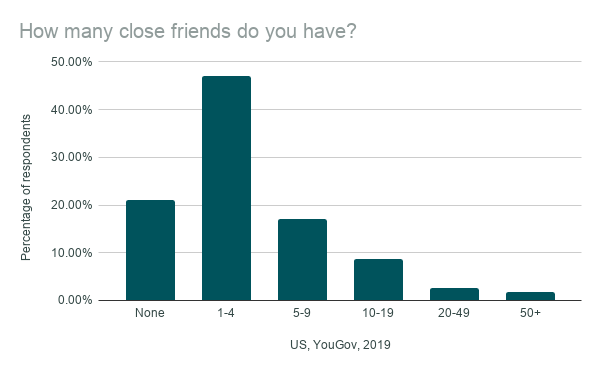
If you’ve ever thought “Why do I have no friends?” it may reassure you to know that you aren’t unusual. A 2019 YouGov survey found that more than 20% of people in the US have no close friends.[1] On your next walk, imagine that every fifth person you meet is in this position.
After reading this guide, you’ll have a clearer understanding of why you don’t have friends and a game plan for how to develop your friend-making skills.
Sections
- Figure out why you feel lonely
- Reasons for having no friends
- Life situations that make it hard to make friends
- Negative mindsets
- 12 bad habits
- How to make new friends
- Benefits of friends
- Common questions
Figure out why you feel lonely
Not having friends can mean many different things. By getting a realistic view of your situation, you’re more likely to succeed at improving it.
Here are some common statements of people who feel like they have no friends:
 
1. “People dislike me, hate me, or are indifferent to me”
Sometimes, we act in ways that make people actively dislike us. Perhaps we’re too self-focused, too negative, we break rapport, or we are too clingy.
However, sometimes it can feel like people don’t like us, even when they do. For example, if someone is busy and can’t meet up, we may think it’s because they don’t like us, even when they would love to hang out but genuinely don’t have the time. Or, if someone doesn’t use smileys in a message, we might think they are annoyed with us, even when they aren’t.
Sometimes, we can even ignore evidence that people appreciate us. For example, we get an invitation to a party, but we think the person invited us out of pity. Perhaps people say nice things to us, but we feel that they are just being polite.
To figure out if people really don’t like you, look at the evidence before you jump to conclusions. First, can you bring to mind any evidence that people seem to like you? For example, maybe someone invited you to their party and said they were really looking forward to seeing you there. Or perhaps someone gave you a compliment like “You always cheer me up.” If you can think of a few examples, good—perhaps you are more likable than you think.
On the other hand, you might be able to think of several incidents that suggest people dislike you. For example, perhaps several people have told you that you come across as boastful or that you aren’t a very reliable friend.
It can be really tough to face the fact that you have some unlikable traits or behaviors. But by acknowledging your flaws, you can also work on them.
2. “I can’t make friends”
If you feel like you can’t make friends, ask yourself whether this thought is grounded in reality. Have there been situations where you have made friends? If the answer is “yes,” you can feel confident that the statement isn’t true.
On the other hand, if you’ve come to the conclusion that you’ve seldom or never made friends, you want to focus your energy on your friend-making skills.
3. “I have friends, but I have no close friends”
Perhaps you hang out with friends regularly in a group, but never with anyone one-on-one. Or, you have friends that you can go out with and have fun with, but you never talk about anything personal or important.
Here are two common reasons for having friends but not having close friends:
- Not opening up and sharing about oneself. For two people to see each other as close friends, they need to know things about each other. If you don’t open up about yourself, your friend won’t feel comfortable opening up in return. You don’t need to talk about something overly sensitive or something that may embarrass you. Just sharing your thoughts and feelings about things that happen is a good start.
For example, if your phone rings and you say, “I always get a bit nervous before I have to answer an unknown number. Do you?” you’ll move the conversation in a more personal direction and encourage the other person to open up about their feelings. - Not allowing the conversation to be intimate or personal. Sometimes, we can feel uncomfortable if a conversation gets too personal. We might change the subject or make jokes. It can help to fight against your discomfort and dare to have a personal conversation. Usually, deeper, more intimate conversations are how two people get to know each other.
In summary, we tend to make close friends when we open up about more personal topics over time.[2]
4. “I have friends, but they don’t feel like real friends”
What if you technically have friends but don’t feel like you can trust them when you need them?
Here are some common reasons why you might have friends who aren’t really there for you when it counts:
- You’ve ended up in a group of toxic friends. If this is the issue, polish your social skills and practice meeting people. This way, you’ll have more options when you want to socialize.
- If you often feel like you can’t count on your friends, and it’s become a recurring pattern in your life, perhaps you ask too much of them. You can expect your friends to help you out every once in a while, but you can’t expect them to always be your mental support.
- Ask yourself whether you have some bad habits that might put people off, such as bragging or gossiping. While this is a painful exercise, it can be helpful in improving your social life.
5. “I have no friends”
Do you really have no friends, or is the situation a bit more complex? Perhaps you can relate to one or more of the following:
- You have always been alone and never had any friends. Focus on the sections Underlying reasons for having no friends and Common mistakes that make it hard to make friends.
- You have had friends previously but don’t currently have friends. If this sounds familiar, it could be that your life situation has changed. For example, perhaps you’ve moved to a new city. In this case, you want to focus on the section Life situations that make it hard to make friends and Tips on how to make new friends.
- You have friends you can count on, but you still feel alone or like they don’t understand you. If this is your situation, you might not yet have found like-minded friends. Feeling this way can also be a symptom of depression or some other mental health disorder.
If you don’t have any form of support system in your life, read our guide on what to do if you have no family and no friends.
Underlying reasons for having no friends
Before we talk about ways you can build friendships, we’ll start by looking at common reasons for having no friends:
1. Introversion
Research shows that 30-50% of people are introverts.[3] Some people almost always prefer solitude over socializing. However, those who prefer solitude can still feel lonely.
If you’re an introvert, you probably don’t enjoy seemingly meaningless social interaction. For example, many introverts find small talk dull. While extroverts usually find social situations energizing, introverts typically find that socializing drains them of energy. While extroverts can enjoy high-energy, intense social environments, introverts tend to prefer one-on-one conversations.
It can help to seek out places where you are likely to meet other introverts to befriend, for example:
- Reading or writing meetups
- Crafts and maker meetups
- Certain types of volunteering
- Many workshops and classes
These places aren’t usually loud or energetic, and you probably won’t be expected to socialize as part of a large, noisy group.
It’s important to note that sometimes, we mistake anxiety or shyness for introversion. We may say that we don’t want to socialize because we are introverts, but in reality, it’s because we suffer from social anxiety.
2. Social anxiety or shyness
Shyness, being awkward, or having social anxiety disorder (SAD) can make it hard to socialize.
However, the only way to find friends is to meet people. To do that, you need to find ways to manage your shyness or social anxiety.
Here’s what to do if you want to have social anxiety and still want to make friends.
3. Depression
In some cases, the feeling of loneliness is a symptom of depression.[4] In this case, it’s important that you talk to a professional such as a therapist.
If you’d like someone to talk to right now, call a crisis helpline. If you’re in the US, call 1-800-662-HELP (4357). You’ll find out more about them here: https://www.samhsa.gov/find-help/national-helpline
If you’re not in the US, you’ll find helplines that operate in other countries here: https://en.wikipedia.org/wiki/List_of_suicide_crisis_lines
If you don’t want to talk on the phone, you can text a crisis counselor. They are international. You’ll find more info here: https://www.crisistextline.org/
All these services are 100% free and confidential.
Here’s a guide on how to cope with depression.
4. Autism Spectrum Disorder (ASD)/Aspergers
One of our readers writes:
“I’m afraid to say things to people the first time I meet them. My autism is my biggest challenge. I don’t want to do things wrong.”
Having ASD/Aspergers can make it harder to read social cues and understand other people’s intentions.
The good news is that many people with ASD/Aspergers are able to learn these cues and become just as capable of socializing as anyone else. Here are some tips if you have Aspergers and no friends. Further down in this guide, we’ll cover additional practical tips on how to make friends.
5. Bipolar disorder
Extreme mood swings or periods of mania followed by periods of depression can be a sign of bipolar disorder. It’s common to withdraw during depressive periods, which can hurt your friendships. But the manic periods can also hurt your friendships. For example, perhaps you do or say things that are inappropriate or out of character.[5]
One of our readers writes:
“I am a medicated bipolar. I tend to talk to anyone, whether I have a “relationship” with them or not.
I want to learn how to self-censor to avoid overstepping others’ boundaries!”
For some people with bipolar disorder, it can be impossible to stop talking. It can help to say something like, “I know that I’m talking a lot. I’m working on it. Please give me a heads up when I do because I don’t always notice.” Practicing relaxing and listening when you are making conversation can also help.
Bipolar disorder can be managed with therapy and medication. It’s important to go to a psychiatrist who can give you proper treatment. Learn more about bipolar disorder here.
6. Other mental health disorders or physical disabilities
There are many other mental disorders or physical disabilities that can make it harder to make or keep friends. This includes panic attacks, social phobia, agoraphobia, schizophrenia, conditions that mean you have to use a wheelchair, being blind, deaf, etc.
Socializing with any type of disorder can be disheartening. People may have incorrect assumptions or make judgments.
Here are some things you can do:
- If you can, seek counseling or therapy.
- If your condition is stigmatized in the general population, it can feel easier to socialize with others who have a similar condition.
- If you have a physical disability, check out your local municipal groups or charities that can make mobility easier. This may help you to access social spaces.
- Find interest groups for people in your situation on Facebook (search for groups), meetup.com, or a relevant subreddit on Reddit.
- Focus on groups that hold ongoing meetups. It’s easier to form bonds with people you see on a regular basis.
7. Not having enough social experience
Social skills are often thought of as something you have to be born with. However, they are skills that can be learned, just like playing the guitar. The more hours you put in, the better you’ll get.
If you don’t have a lot of social experience, put yourself in situations where you get to meet people, such as:
- Going to meetups related to your interests
- Volunteering
- Taking a class
- Saying yes to invitations and opportunities that come up
It’s rarely fun to do something we don’t feel good at. However, it becomes more enjoyable when you notice that your skills improve. At first, you will have to push yourself to meet people even when you don’t feel like it.
You might have thoughts like, “What’s the point? I still won’t be able to make any friends if I go.” But remind yourself that every hour you spend socializing is an hour closer to becoming a socially skilled person.
When playing the guitar, you’ll learn faster if you study the theory alongside your live practice. The same goes for socializing, so be sure to study social skills.
8. Being too quiet and not getting noticed in groups
When you’re socializing as part of a group, it’s often easier to just defer to others and listen rather than jumping in and saying something. Groups can be intimidating. However, it’s better to say something than nothing at all. With practice, you can learn to stop being quiet in group situations.
People need to get to know you and see that you’re friendly and interesting. Join in, even if you don’t know if what you say will be interesting enough. It’s not really important what you say, but that you show you want to participate in the conversation and that you want to engage with other people.
9. Anger issues
Anger can be used as a defense mechanism when you feel uncomfortable or insecure in social situations. Anger can even have a self-soothing effect on us.[6]
Unfortunately, reacting this way can be off-putting because people may think that you’re angry with them or that you’re an unhappy person.
Being angry intimidates people, and it will prevent them from trying to get to know you or being open to your overtures of friendship.
Try letting yourself feel the emotions of fear and uncertainty in social situations, and don’t try to push them away with angry or defensive thoughts. Rather than lashing out, make it a habit to take a few breaths when your anger hits. Always wait before you act in anger. This can help you respond more rationally and avoid damaging your social life.
Consider seeing a therapist. They can help you give personalized tools to control your anger.
We recommend BetterHelp for online therapy, since they offer unlimited messaging and a weekly session, and are cheaper than going to a therapist's office.
Their plans start at $64 per week. If you use this link, you get 20% off your first month at BetterHelp + a $50 coupon valid for any SocialSelf course: Click here to learn more about BetterHelp.
(To receive your $50 SocialSelf coupon, sign up with our link. Then, email BetterHelp’s order confirmation to us to receive your personal code. You can use this code for any of our courses.)
If you’ve read this chapter and still aren’t sure why you don’t have any friends, it may help to take our quiz: Why do I have no friends?
Life situations that make it hard to make friends
Your life circumstances can also make it difficult to make friends. For example, perhaps you’re living in a rural area or you move around a lot. Or maybe your friends are moving away, starting their families, or making other lifestyle changes that take up time they previously spent on their friendships.
Here are some of the most common scenarios that make it difficult to build friendships:
1. Not having social interests
Social interests are interests, hobbies, and passions that you can use to meet people.
Meeting people through your interests is an effective way to make friends: you’ll automatically meet like-minded people while doing what you like.
Not everyone has a passion or hobby that they live for. The good news is that you can use any type of activity that you enjoy doing to meet new people.
Try going to Meetup.com and look for events that seem fun to you. Look especially for events that meet up on a regular basis (once a week or every other week). At these events, you’re more likely to meet people enough times to be able to make friends with them.
Other good places to look are Facebook groups and subreddits.
2. Recently having lost your social circle
Big life changes, such as moving, changing or losing your job, or breaking up with a partner, can cause you to lose your social circle.
The most effective way to build up a social circle from scratch is to actively take the initiative to socialize. This can feel new if you’ve previously tapped into a social circle with less effort – such as through work, college, or a partner.
Here are some examples of taking the initiative:
- Join a co-living space
- Say yes to invitations
- Take the initiative to keep in touch with people you like
- Join groups and meetups
- Volunteer
- Join and reach out to people on a friend-making app such as Bumble BFF (This app isn’t the same as the original Bumble, which is for dating. Here’s our review on apps and websites for making friends.)
- If you’re about to meet with a few friends, invite others who you think would be a good fit
- If you study, join extracurricular activities
- If you work, join relevant social groups and go to after-works events
Remind yourself of times you’ve made friends in the past. This can help you see that your current situation is likely to improve, even if you feel lonely right now.
Know that it takes time to build a social circle from scratch. Continue taking the initiative even if you don’t see immediate results.
3. Having moved away from your hometown
Moving to a new city robs you of your old social circle and puts you in an unknown environment. Therefore, it’s common for people to feel lonely after moving. You can use this to your advantage—there are usually many other people who are also looking for friends. However, you need to be proactive if you want to make friends in a new city.
4. Changing jobs, losing your job, or having no friends at work
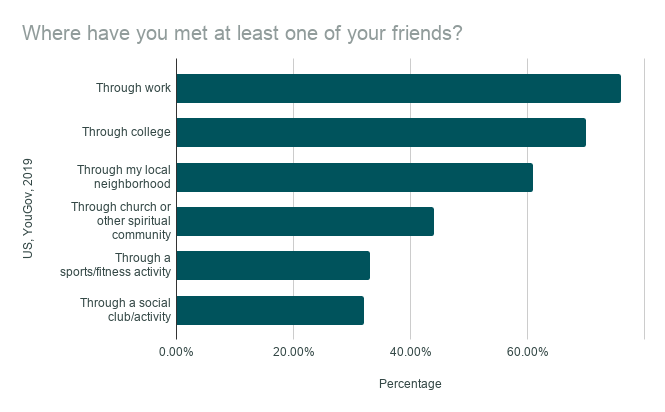
Work is the most common place to make friends
For many, work is our main venue for socializing. We often spend more time with our colleagues than we do with our spouses or friends outside of work, and it’s completely normal to feel lonely if you lose your old colleagues.
Don’t forget that you can still keep in touch with your old colleagues even if you don’t work together anymore. Let them know that you still want to keep in touch, and ask them to let you know when they are up for something. Take the initiative by inviting them over for dinner or drinks.
Changing jobs
It takes time to make friends at a new job. Most people have their existing friend groups that they feel comfortable in, and you are new and unknown. When your colleagues prefer to hang out with each other rather than you, it doesn’t mean that they don’t like you, just that being with their existing friends is less uncomfortable. If you are warm and friendly and take them up on their invitations, you will be accepted with time.
Losing your job
At work, friendship is something that slowly develops when we spend enough time together. So if you lose your job and don’t automatically meet people on a regular basis, you’ll have to be more proactive. For more advice on proactive ways to make friends, read the section Recently having lost your social circle.
You can choose to see losing your job as a blessing in disguise for your social life. Rather than making friends with whoever happens to work at your job, you can now have more influence over who your friends will be. You now have the opportunity and time to seek out people who are more on your wavelength.
Having no friends at work
There might be several reasons for not having friends at work. We cover many of them in the article above. However, in certain situations, you might work remotely, have very few colleagues, or just not have anything in common with them. In this situation, it’s extra important to look at making friends outside of work. We’ll talk more about how to do that later in this guide.
5. Having no friends in college
It’s common not to have any friends during your first few months in college. Many people have to start building their social circle from scratch. Here’s what you can do to speed up this process:
- Become an active member of a student organization or club
- Participate actively in your online class discussion forums
- Take the initiative, e.g., invite people to lunch, study, or play a sport
- Talk in class and make plans to do things afterward
You might also like this article on how to make friends in college.
6. Having no friends after college
In college, we meet like-minded people on a daily basis. After college, socializing requires more effort. Unless you want to limit your social life to your job or partner, you have to actively seek out like-minded people. The simplest way to do this is to figure out in what way you can make your existing interests more social.
Here’s our main article on what to do if you have no friends after college.
7. Living in a rural area
The upside of living in a rural area is that it’s often more intimate. Usually, everyone knows everyone, while a city can be more anonymous. However, if you don’t get along with people around you, it can suddenly be much harder to find like-minded people.
If you want to be more involved and meet more people in a rural area or small town, it’s usually a good idea to join local groups, and boards, or to help neighbors out whenever needed. There are usually many opportunities for this if you ask around. Even tiny hamlets have numerous boards for road maintenance, forestry, farming, or hunting that you can join. Doing this gives you a ready-made social circle.
If you don’t click with those who live in your area, and this makes you feel lonely and isolated, you can consider moving to a bigger city.
While this can sound intimidating, there’s an upside: you can more easily seek out people who are more like you. See the advice under Recently having lost your social circle.
8. Not having any money
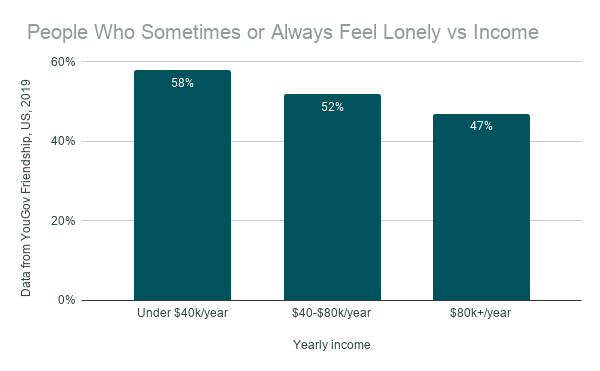
Not having any money can make it harder to socialize. It can also feel embarrassing and make the idea of socializing sound less appealing. In addition to that, financial worries cause stress that makes it hard to focus on having a social life. Here’s some advice:
- Focus on free events. Events on Meetup.com are usually free.
- Choose a picnic in a park over drinks in a bar, or cook at home instead of going to a restaurant.
- Hiking, working out, running, some sports, playing video games, or watching movies at home can be relatively cheap ways to socialize.
- If you go to a bar, go for soft drinks instead of alcohol. You’ll probably save a lot of money.
- If someone wants to go to a more expensive place, explain to them that you don’t have the money for it, and offer a cheaper alternative.
9. Not having enough time
If you are busy with work or studies, you might simply not have the time to socialize. Here’s some advice:
- See if you can study or work together with other coworkers or students.
- Remind yourself that a few hours of socializing a week can give you important breaks that, in the end, will help you be more productive.
- Sometimes, our brain can make up an excuse that we don’t have time to meet people when in reality, we do. The real reason we don’t socialize could be that we feel uncomfortable doing it or feel like it won’t be fruitful. If you can relate to this, make a conscious decision to prioritize socializing occasionally, even if you don’t feel like it.
- If you don’t find socializing very rewarding, polish your social skills. That can help you build relationships more effectively.
10. Only socializing with your significant other
A partner can fulfill our social needs, at least to the point that we aren’t motivated enough to go out and socialize with strangers.
However, putting all your friendship eggs in one basket has drawbacks:
- If your friendship only consists of one person, you might be overly dependent on that person. Conflicts or problems in the relationship can feel worse or harder to handle if you have no one else to interact with.
- You risk suffocating your partner. They may need you to be able to talk out your troubles with others, so they aren’t your only outlet. When you become their one and only true friend, life can get overwhelming fast for both of you.
- If you break up with your significant other, you might have to start your friend circle from scratch.
To prevent this, seek out a wider circle of friends.
11. Having broken up with your significant other and lost their social circle
It can be hard to suddenly have to make new friends again if you previously had a friend circle through your partner. Research shows that men especially have fickle social circles that are based more on activities than emotional bonding.[7] However, it’s also common for women to lose their social circle if they lose their partner. On top of this, reaching out to others tends to be especially hard if you are heartbroken or sad.
It can be a good idea to push yourself to socialize and meet new people even if you don’t feel like it. Doing so can also help take your mind off your ex. You’ll find specific advice for how to socialize under Recently having lost your social circle.
You might also like this article on how to overcome loneliness after a breakup.
Negative mindsets that can stop you from making friends
To make friends, you may have to change your thought patterns and mindset. Here is how to overcome beliefs and attitudes that can stop you from making friends.
1. Being afraid of rejection
To make friends, you need to practice taking the initiative. It could be the initiative to exchange numbers and keep in touch, to invite someone to join you somewhere, to arrange a social gathering, or simply walk up to a new colleague with a friendly smile and introduce yourself.
However, fear of rejection can keep us from taking the initiative. It’s especially common to fear rejection if you’ve been rejected in the past. For example, if you’ve texted people and asked if they wanted to meet up, and you didn’t get a response, it’s completely normal to not want to risk experiencing the same thing again.
The good news is that the more you work on your social skills, the more likely you are to connect with others. This makes you less likely to experience rejection again. You can also change the way you look at rejection. Rejection might feel like a failure to you, but in reality, it’s a sign of success. It’s proof that you’ve been brave enough to take the initiative.
Remember, the only way to never be rejected is to never take any chances in life. Everyone experiences rejection. Socially successful people have learned that it’s nothing to be afraid of.
2. Assuming no one will like you
“ I can’t talk to people without feeling like I’m the most annoying person on the planet. I always worry about what people will think of me.”
Everything that comes out of my mouth is wrong. On top of that, I’m not interesting or beautiful enough for anyone to want to be friends with me.
I don’t even know how to try and make friends since I can’t even order myself food at restaurants or answer the phone, let alone approach people and try and make their acquaintance.
I honestly wish I was anyone but me.”
It’s surprisingly common for people to think things like “No one will like me.” Here are some reasons we might feel this way:
- Having a traumatic experience in the past that made us feel unwanted.
- Having low self-esteem. Low self-esteem is associated with negative self-talk, such as “You’re worthless,” “Why would anyone want to be your friend,” etc.
- Misinterpreting others. Here’s an example: You walk up to someone and introduce yourself, but they give only short responses and don’t make eye contact. Perhaps you think that this person doesn’t like you but, in reality, they are just shy and don’t know what to say.
If you assume that new people you meet won’t like you, that can make you come off as stand-offish, and then others will be stand-offish back. This can then reinforce your view that people won’t like you.
To break out of this pattern, try to be warm and friendly toward people, despite fearing that they might not like you.
Here are some ways you can be warm and friendly:
- Smile and make eye contact
- Ask a question or two to get to know them
- If someone does something that you like, compliment them for it.
We tend to like those who like us. Psychologists call this reciprocal liking.[8] This means that people are more likely to like you if you show that you like them.
Remind yourself that every person you meet is a new start. They haven’t made up their mind about you yet because they don’t know you. If you dare to be friendly, more often than not, people will be friendly back.
Always challenge your internal voice. It might just be your low self-esteem painting worst-case scenarios. Assume that people will like you until proven otherwise.
3. Not liking people or feeling resentment toward others
With all the bad things that go on in the world, you could argue that it’s reasonable to dislike or even hate people.
It can also be annoying to hear people talk about meaningless things, and it can make us wonder if we even want to interact with anyone.
The problem is that while many people might indeed be annoying or stupid, there are always thoughtful, warm, and friendly people out there. If we’ve decided already that we don’t like anyone, we’ll never be able to find these good people or give them a chance.
Another issue is that we might be too quick to judge others if we decide that we don’t like anyone. The more you get to know someone, the more you’ll understand the logic of their actions.
It helps to go to the right venues. If you are analytical and introverted, you’ll have more success finding your people at a chess club or philosophy meetup. If you care strongly about the climate, you’re more likely to find like-minded people at a climate action group.
However, it isn’t enough to find the right places. You often need to talk with someone for at least 15-20 minutes before you figure out if you have something in common. Everyone comes off as boring and uninteresting before you’ve gotten to know them. (That might include you!)
While small talk can seem meaningless, it has an important function: It allows us to quickly get a picture of someone. By asking the right questions, you can figure out what they work with, what they studied, and what’s important to them.
No matter if we like small talk or not, every single friendship starts with small talk, so you might as well make the best of it. You might like to learn more about how to make small talk.
4. Assuming that it’s too hard to make friends
It’s common to have thoughts like “I won’t be able to make friends in any case” or “It’s not worth spending hours talking to someone only to find out that they never want to hang out anyway.”
While it can feel like a hopeless situation, here’s some advice.
- Remind yourself that apart from yourself, there’s nothing holding you back from making friends. You are in control of this part of your life.
- There’s no magic to making friends, and it’s not the case that some people are “just born with it.” It’s a skill that anyone can learn. If you feel like people don’t respond well to you, the solution is to work on your social skills.
- When we feel lonely, it’s easy to be overwhelmed with negative emotions, including resentment, anger, sadness, and hopelessness. We might blame others, our life situation, or almost feel cursed. No matter how strong these emotions are, remind yourself that working on your social skills will improve your social life.
It can be helpful to break down your goals into small steps. Don’t overwhelm yourself by trying to build a great social life overnight. Focus on taking one step at a time.
5. Thinking it’s not fun to socialize
There are many reasons why you might think that socializing isn’t much fun. Perhaps you’re an introvert, you suffer from social anxiety, or you don’t feel like you connect with people.
If you feel this way, here’s some advice:
- If you’re an introvert, seek out venues where you are more likely to find other introverts. For example, if you go to Meetup.com and look for groups that match your interests, you are more likely to meet people with similar personalities.
- Know that while small talk might feel meaningless, it’s a good way to figure out what you may have in common with someone. You can read more about this under Not liking people or feeling resentment toward others.
- Some people don’t like socializing because they feel anxious or don’t know what’s expected of them, how to act, or what to say. This drains their energy. If you can relate to this, know that socializing will become more fun the more experience you gain. Continue pushing yourself to go to social events and work on your social skills at the same time.
- The most effective way to overcome social anxiety is to expose yourself to social situations. Start gradually with situations that are just medium-scary, and work your way up.
6. Having a hard time trusting people and not opening up
If someone’s betrayed you in the past, it can be hard to trust again. The problem is that trust issues keep us from letting ourselves get close to new people. To make friends, you have to let people in and get to know you.
The good news is that you don’t need to reveal your innermost secrets or make yourself vulnerable.
Practice sharing small things about how you feel and see the world, even if it makes you uncomfortable. It can be small things like “I tend to get anxious before these types of events,” “I never really liked the Lord of the Rings movies, I’m more into sci-fi,” or “This is my favorite song. It always makes me happy.”
Avoid controversial topics, but give people a glimpse of who you are. For two people to get to know each other, they need to know things about each other.
The only thing that’s more damaging than being betrayed is to decide that you won’t trust people. This attitude will keep you from forming close relationships.
Sometimes trust issues are deep, for example, if we haven’t been able to trust our parents. In these types of cases, it can be helpful to see a therapist.
We recommend BetterHelp for online therapy, since they offer unlimited messaging and a weekly session, and are cheaper than going to a therapist's office.
Their plans start at $64 per week. If you use this link, you get 20% off your first month at BetterHelp + a $50 coupon valid for any SocialSelf course: Click here to learn more about BetterHelp.
(To receive your $50 SocialSelf coupon, sign up with our link. Then, email BetterHelp’s order confirmation to us to receive your personal code. You can use this code for any of our courses.)
7. Feeling like you don’t fit in or that you are different
If you feel like you don’t fit in, remind yourself that there are other, similar people out there. You just need to find them.
Seek out groups that fit your interests. If you live in a small town and your social life is suffering because of that, consider moving somewhere else.
Practice your social skills. It takes good social skills to be able to get to know people and figure out that you actually do have things in common.
Sometimes, however, feeling like people don’t get you and that you don’t fit in anywhere can be a sign of depression.
12 bad habits that make it hard to make friends
So far, we’ve talked about underlying reasons and life situations that make it hard to make friends. However, we might also have some bad habits and behaviors that make it difficult to make friends. A bad habit we’re not aware of can often cause unwanted social mistakes. Taking a closer look at common bad habits can help us become more aware of our own behaviors so that we can change them. Here are 12 common bad habits and mistakes that can stop us from making friends.
1. Showing too little empathy
Empathy is the ability to understand how others feel. Understanding others’ thoughts, needs, worries, and dreams is an extremely important skill if you want to make friends. Studies show that people who score high on empathy tests have more friends.[9]
You can become a more empathetic person by:
- Being curious about strangers. Ask them questions to learn more about them. Listen attentively when they answer.
- Keeping an open mind. If you notice that you’re judging someone, see if you can try to understand them instead.
- Thinking about how others feel. If someone gets interrupted, ridiculed, or teased, focus on what emotions you think that person might feel. Or, you can look at people you come across in day-to-day life and try to guess what emotions they are experiencing.
- Trying to see things from the other person’s perspective. What are some explanations for other people’s actions? (Don’t be too quick to assume that they are just “stupid”, “ignorant”, etc.)
- Turning the tables. If what happened to someone else happened to you, how would that make you feel?
People with social anxiety usually have high levels of empathy[10] and care a great deal about what other people think. They might struggle to make friends because they hold themselves back from meeting people, not because they can’t feel or show empathy.
2. Not knowing what to say or not feeling like talking to people
Sometimes, it can feel impossible to know what you’re supposed to talk about. However, we have to make small talk for people to get to know us and feel comfortable around us.
Practice starting conversations with people, even if you don’t feel like it.
You want to use small talk as a tool to paint a picture of someone and share a little about yourself. Then, you want to be able to move on to more interesting topics so that you can start bonding.
We provide several tips for how to do this in our article on how to make conversation.
3. Talking too much about yourself or asking too many questions
We tend to bond faster when we have back-and-forth conversations: we share a little about ourselves, then listen attentively to the other person, then share a little more, and so on.[2] Going back and forth like this makes everyone feel engaged.
Firing a stream of questions can make the other person feel interrogated, and at the same time, they don’t get to know you. On the flip side, other people will soon tire of you if you only talk about yourself.
Aim to strike a balance between sharing about yourself, asking questions, and listening attentively.
If you tend to talk a lot about yourself, it can be helpful to sometimes ask yourself, “Is what I’m talking about interesting to the other person?” One way to make the other person feel more engaged in the conversation is to ask what their take is on the subject, listen attentively to their answer, and ask follow-up questions about that answer.
4. Not keeping in touch with people you meet
If you’ve come across a person you get along with, how do you keep in touch and turn that person into a close friend?
Make it a habit to ask for the number whenever you come across someone you enjoyed talking to. You can say something like, “I enjoyed our conversation. What about trading numbers so that we can keep in touch?”
It can feel awkward and too intimate to ask someone you just met to meet up with you one-on-one. Rather, make sure to invite the person whenever you’re going to some social event that might be relevant to them.
For example, if you know two people who are both as interested in History as you are, you can ask both of them if they want to meet up together over a coffee and talk about History.
5. Trying too hard to make someone like you
Some are so concerned with making others happy that they hide their real selves. Being a people-pleaser can signal a desperate need for acceptance, and that makes someone less likable.
Friendship is a two-way street. Don’t do what only pleases others. Don’t do what only pleases you. Do what you think is right for both of you.
Here’s a good way to think about it: don’t pick the movie you think the other person will like the most. Don’t pick the movie you think you’ll like the most. Pick the movie you think both of you will enjoy.
6. Not looking approachable
No matter what your intent is, most people won’t dare to interact with you if you look tense, annoyed, or angry. This is a common problem because we tend to tense up, especially if we feel uncomfortable around others.
If you can relate to this, practice easing up your face and having a friendly facial expression. Avoid crossing your arms because this can also make you look reserved.
See our article on how to be more approachable to learn more about effective body language.
7. Being too negative
We all feel negative about things or about life in general from time to time. However, being too negative will put people off.
Avoid:
- Complaining
- Telling stories about something bad that happened
- Bad-mouthing people
While everyone has the right to bring up something negative occasionally, it will likely hurt your relationships if you are usually negative. Sometimes, we may not even be aware of how negative we are.
You can check if this is you by thinking about your ratio of positive and negative comments. You want the positives to far outweigh the negatives. This doesn’t mean that you need to fake positivity, just that you want to save people around you from too much negativity.
You can also find these tips on being more positive helpful.
8. Using your friends as therapists
When life gets tough, it’s completely normal to want to talk to friends about it. Talking about a challenge occasionally is fine and can even help them get to know you better. However, using your friends as therapists will wear on them. They might have the best of intentions, but if they’ve been your mental support for a long time, they might prefer someone who is less emotionally taxing to be with. This is a harsh reality, but it’s true.
If you are able to go to a real therapist, you could do that instead. If not, see if you can limit how often you talk to your friends about things that are emotionally taxing. You can also try online therapy services.
9. Being too clingy
Some of us are too stand-offish. Others are too attached.
Clingy friends tend to need a lot of validation and can have unsaid expectations or rules that are easy to break, which then causes tension in the friendship.
If you find that you do seem clingy, remember that friendship requires both people to be equally invested in the time you spend together.
If you find yourself pushing for more than your friend can give, then try contacting your friend a bit less. Focus more on getting to know other people to cover your social needs. Don’t stop keeping in touch with your friend completely. You want to find a balance where you both feel comfortable.
10. Not being flexible or accommodating
Perhaps last-minute changes rattle you. Let’s say that the plan was to go to the movies or on a road trip, but now that’s off. The new plan may not be better or worse, just different. If you don’t like that because you were ready for “A,” not “B,” challenge yourself to respond in a more easygoing way.
You can try changing your default switch to “Why not?” instead of “Why?” Give yourself a chance to adapt. Let yourself think about the good things that could happen if you say “OK.”
11. Having unrealistic standards for toxic behavior
There will always be individuals who are toxic, egoistic, and rude. However, if you feel like you constantly meet this type of person, it’s possible that you’re misinterpreting others’ actions.
Here are some examples of how we can misinterpret normal behavior for toxic behavior:
- If someone cancels your meeting at the last minute and blames work, they might be rude or selfish. But another explanation could be that they are truly overworked or have personal reasons for canceling.
- If someone stops keeping in touch with you, they might be egoistic or self-serving. But it could also be that they are busy or that you’re doing something offputting that means they find it more rewarding to spend time with other people.
- If someone complains about something that you do, they might be abusive or ignorant. But it could also be that they have a point and say something that can help you be a better friend.
In all these examples, it’s hard to know what the truth is, but it’s worth evaluating all possibilities. Judging others too harshly and too quickly can make it hard to build fulfilling, deep friendships.
12. Lacking self-awareness
Perhaps your family and friends have dropped hints about issues in your behavior that you can’t see or don’t agree with. It could be that they’re wrong, or it could be that they see something you don’t.
If one or two friends give up on you, the issue is likely theirs. Perhaps something happened in their lives, or maybe they are selfish. But if lots of people have ghosted you, the underlying cause might be your behavior.
Self-awareness helps us see ourselves from a more objective perspective.
Think back to a time when someone raised an issue about your behavior. It could be things like “You don’t listen,” “You talk a lot about yourself,” or “You are rude.”
It’s natural to come up with examples that disprove their point. Can you also come up with examples that do prove their point? If not, great. Perhaps it was just something they said for no good reason. However, if you can agree with them, that’s even better because now you have a concrete thing that you can work on.
Tips for making new friends
Up to this point, we’ve been talking about life situations, underlying factors, and common mistakes that make it hard to make friends. But how do you actually make new friends, step by step? People often meet new friends through their existing contacts. But if you lack contacts or friends, you may need to use some different strategies.
Below are some tips to start making friends even if you have none:
- Go to places where you meet people regularly. It could be a social job, classes, volunteering, a co-working place, or meetups.
- Say yes to invitations. Take every opportunity to socialize, even if you don’t feel like it.
- Remind yourself of the value of small talk. While small talk can feel meaningless, remind yourself that every friendship started with small talk.
- Be friendly. For people to like you, you have to show that you like them. Use open body language, ask friendly questions, and listen carefully.
- Be curious about people. This helps you figure out if you may have something in common. When you find commonalities, it’s more natural to keep in touch.
- Dare to open up. It’s not true that people only want to talk about themselves. They also want to get to know who you are. How else will they know if it’s someone they want to befriend?
- Don’t write people off too soon. Few people come off as interesting within the first few minutes of your first conversation. Try to get to know people before you decide if they’re interesting or not.
- Take the initiative. Text people and ask if they want to meet, walk up to groups, and make small talk. Taking the initiative is usually scary as you might get rejected. But if you don’t take chances, you won’t be able to make friends.
Benefits of making friends
Recent studies have found that friends aren’t just nice to have; loneliness can even shorten our life expectancy. One study found that feeling lonely is as dangerous as smoking 15 cigarettes a day.[12]
Scientists believe that being social has been important for survival throughout human history. Individuals with tight friend groups had better support and protection than those who were lonely.[13] Much like feeling hungry is meant to motivate us to eat (so that we stay healthy), feeling lonely is likely meant to motivate us to seek out friends (so that they can keep us safe).[14]
The takeaway is that it’s natural to experience loneliness. Loneliness can be incredibly painful. But there’s a silver lining: It can give us the motivation we need to eventually succeed in getting great, like-minded friends we can truly rely on. More in our article on how to deal with loneliness.
Common Questions
Is it OK to have no friends?
No matter what people tell you, it’s completely OK to have no friends. It’s your life, and you get to decide how you want to live it. Many people don’t have any friends.
Don’t try to make friends just to meet other people’s expectations. Only try to make friends if you believe that it will make you happier. While it’s completely your choice how you want to live your life, know that most of us tend to feel lonely if we don’t have any friends. So while it’s OK to not have friends, most people would say that you need friends to live a fulfilling life.
How long does it take to make a friend?
To make friends with someone, we need to spend a lot of time with that person.
According to one study, people spend hundreds of hours with someone before they see that person as a “good friend” and many hours more to be considered a “best friend.”[11]
Here’s how many hours you need to spend together to become friends:[11]
- Casual friend: 50 hours of time spent together
- Friend: 90 hours of time spent together
- Good friend: 200 hours of time spent together
This explains why it’s so hard to make friends with someone we met at a one-off event or meetup. It’s easier if you have a reason for keeping in touch and meeting regularly. This is why classes and regular meetups are good options.


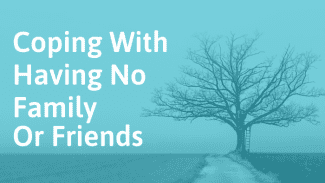

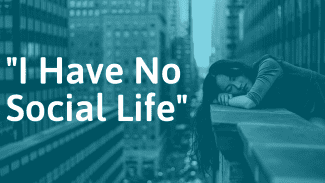
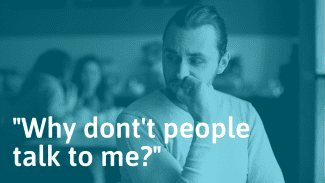








You left out they sometimes people are SICK. Kind of hard to make friends when sick.
Please stop suggesting MeetUp as a way to meet friends. It’s not, and I’m so tired of being the number one piece of advice in every Google search. For people who are shy and struggle with social anxiety, MeetUp does not help. You end up standing by yourself too scared to talk to people and no one comes up to you. I’ve gone to 20+ meetups, and have not made a single friend from any of them. The MeetUps are close-knit cliques that are not welcoming and don’t care about newcomers. It’s like high school all over again. I am so tired of being alone and having nobody, but MeetUp is definitely a waste of time and energy. And also, MeetUps might be free to attend, but they are almost always somewhere where you need to spend money. So no they are not actually free.
Totally agree. I have been a member of multiple meetup groups for years and thought I had made friends, but none of them turned into real friends. I even was a group organizer for several years until health issues forced me to stop. People in that group felt like friends to me, but it was all superficial to them. No one really cared. Meetup.com has actually been quite a painful experience for me. I am always able to bond with others and it seems they just don’t bond with me.
In my case, I only went to meetups that were free or really low cost. But you are right in that most of the meetup groups end up costing you money in one way or another.
And some are cliques where you end up feeling alienated.
Yeah, I would not recommend Meetup.com if your goal is making friends. It seems like all the people who attend the meetups are there to be entertained for the moment and then they go home and go back to their lives and the other people from the meetup group are forgotten until the next meetup.
Another reason I don’t recommend Meetup.com is that if you do make friends in a meetup group, and then your circumstances change and you can’t attend the meetups anymore, the group just goes on without you. They act like you are no longer alive. These are not friends. I don’t even know what to call them. Even if you stay in contact and express an interest in getting together, they don’t seem to want to get together anymore without the group there. It’s like a one on one relationship is too much for them. Like they can’t socialize with others unless there is a social structure there with rules and some type of organization. OR, they never really liked you and only were friendly with you because you were there at the meetups. Who knows. People are so messed up and damaged. Even when you do make friends with someone, eventually it falls apart. I don’t think there is a solution to this problem of loneliness. I think you can feel good for a while and have friends for a while, then things change and you always end up back at square one with no friends or no real friends. I’m 53 and that has been the way my entire life has gone.
Jennifer, you hit the nail on the head. This is not only true of Meetup but other situations in general where people meet and mingle in pre-arranged groups. People come and go in life and having long-standing relationships with others is the exception rather than the rule. But on the positive note, individuals may come into your life at an unexpected, unplanned time and place, and yet a genuine friendship may develop in wonderful ways you never could have imagined. This has happened to me and has changed my way of thinking. It’s possible to go for a long time in a “drought” but patience and belief in yourself will eventually yield positive results. The key is in not trying so hard to make friends, or become so laser focused that you miss out on the many other things in life that are beneficial and rewarding. Relax, keep yourself open to friendships, but not be obsessed in finding friends, especially in unnatural or contrived situations. Wonderful relationships happen when you are busy making other plans.